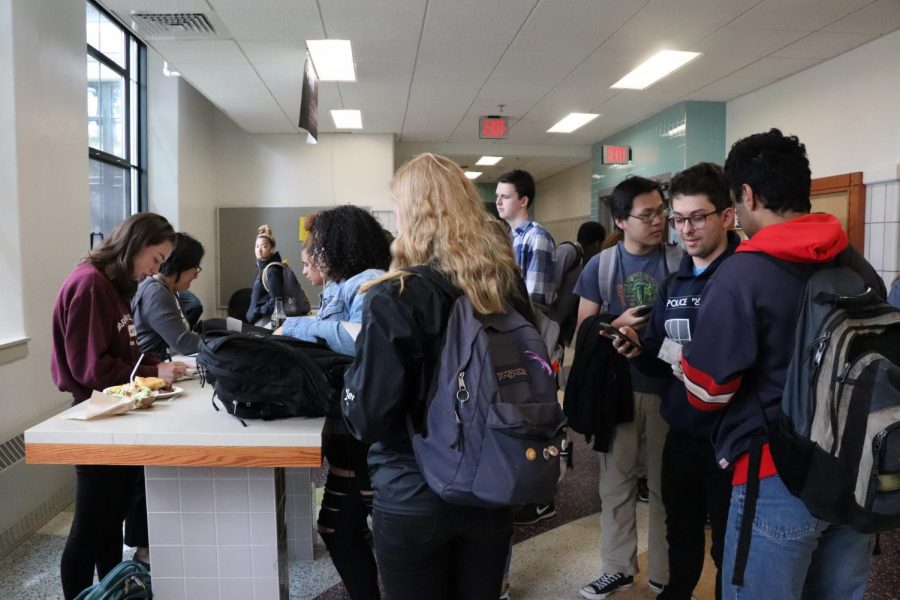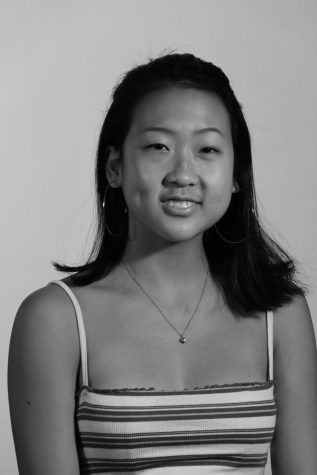New Pilot: Subsidized Prom Tickets
Pictured: Seniors buying prom tickets at the bagel benches during lunch.
May 30, 2018
This year, Student Government was granted $4,000 by the Cambridge Community Foundation (CCF) and the City of Cambridge to subsidize senior prom tickets for low-income students.
Since the beginning of the 2017-2018 school year, various students, School Committee members, and administrators have been discussing ways to combat inequities caused by the high cost of CRLS prom tickets. This student-led push, which stemmed from informal Student Government conversations, was ultimately settled on May 2nd—when the official decision to pilot subsidizing tickets was made by Principal Smith, Superintendent Salim, School Committee member Patty Nolan, and other district officials.
“Events just are not representative of the school,” explained Student Government member Lorra Marseille ’18, who led the initiative along with Student Body President Sophie Harrington ’18. “[The school] tries to cater to students of low income, but trying is different from succeeding to do so.” Marseille specifically brought up the lack of diversity at this year’s Winter Ball. Harrington and Marseille met with School Committee member Laurance Kimbrough in early January to pitch their proposal: $5,000 from the School Committee budget to subsidize all school dances, including both proms and Winter Ball. “[The proposal was designed] so that it would be a lasting thing, that $5,000 would always be allocated to Student Government, because money will always be an issue for some students,” commented Harrington.
According to Harrington and Marseille, Kimbrough was hesitant to support a movement that put taxpayers’ dollars towards dances where students might behave irresponsibly. He suggested implementing the subsidy along with a waiver signed by all prom attendees that there would be no usage of alcohol or drugs. However, Harrington and Marseille believed this was a separate issue that should not stand in the way of ticket subsidization. “It was frustrating because the idea of wanting to ensure that all students can attend an all-school event has nothing to do with drug use,” said Marseille.
Following Harrington and Marseille’s meeting with Kimbrough, there was a lull in the project until it was picked up by School Committee member Patty Nolan. Throughout the month of April, Nolan and Harrington worked to move the project forward. The two reached out to Mayor Marc McGovern, who was very supportive, according to Nolan.
Due to the late timing of the initiative, the district was hesitant in its financial support. As a response, Nolan reached out to the CCF, an organization supportive of CRLS initiatives in the past. According to CCF president Geeta Pradhan, there is typically a more complicated, time-consuming process to making grants. However, this project was a “no-brainer,” allowing the organization to write up a grant for $1,500 within a day.
“With the prom being an important rite of passage into college life and adulthood, we wanted to make sure all our young people were able to attend,” explained Pradhan. “This was, in a sense, a symbolic representation of the bigger issue of having equity in our city… and we wanted to make it happen.”
The City of Cambridge donated an additional $2,500, making this year’s funding total $4,000. Though it is less than the $5,000 goal Harrington and Marseille had set, they remain confident that the money will be used wisely, based on the varying needs of students.
Many hope that there will eventually be a more permanent solution for the subsidization of all Student Government events so that the events can promote diversity and opportunity at CRLS. “I would love to see a future where there is a set amount of money that we can use as a base to make all of our events—not just prom—equitable and strong,” commented dean and Student Government advisor Ms. VB. Harrington also sees this pilot as just the beginning of a much more extensive mission for a better community and increased student advocacy.
“I hope that this becomes more than just a ‘money for prom’ thing,” she said. “I hope this motivates other students to ask for money to fund projects … because students have ideas, and the ideas they have are valuable.”
This piece also appears in our May print edition.









